|
Ex: http://www.fahentraeger.com/
Nur Fragende, nur Haderer mit der eigenen Lehre können heute Lehrer und Führer sein. Das heißt nicht, dass Renegaten der plumpen oder sublimen Art nach einem Jahrzehnt des Liebäugelns mit der Macht sich uns wieder anschließen sollen. Ihnen gilt das alte Wort von denen, die ihr Pfund verwuchert haben. Es heißt, dass nicht einfach die grauen und gesichtslosen Gestalten der saturierten konservativen Bürgerlichkeit, die nie einen Juden vergast, nie einen Russen geschlagen haben, aber auch nie angstvoll von der Zukunft ihres Landes geträumt haben, als sich die nationalsozialistische Hybris über Europa emporreckte, nie an die Würde des Menschen gedacht haben, als man in ihrer Gegenwart polnische Arbeiter an Meistbietende feilbot, sich heute an die konservative Renaissance anhängen dürfen.
Wer „unerschüttert“ durch die letzten zwanzig Jahre ging, hat nichts mit uns zu schaffen. Es geht um die, denen die Realität dieser Zeit das Angesicht des Göttlichen so verdunkelte, dass sie die Unzulänglichkeit der alten Wortlehren stark genug empfanden, um an die Grenze des Nihilismus zu gelangen. Die Nihilisten von gestern werden die Boten des neuen Konservativismus sein.
Wer nicht gespürt hat, dass in der Zeit der bombastischen Heilslehren das Fragezeichen zum Kennwort der neuen Bruderschaft werden musste, hat nicht verstanden, dass wir an einem Abschnitt der deutschen Geschichte stehen, an dem alle alten Tafeln neu geschrieben werden müssen.
Man gestatte mir, diese – ein wenig veränderten – Sätze aus einem kleinen an anderer Stelle veröffentlichten Aufsatz von mir noch einmal zu wiederholen. Sie mögen verdeutlichen, weshalb mir heute gerade ein Hinweis auf das Schaffen Ernst Jüngers notwendig, mehr, weshalb mir ein Ja zu diesem Werk ein Gebot der Redlichkeit zu sein scheint.
Wenn irgendjemand, hat Ernst Jünger heute den um einen neuen geistigen Standort Ringenden gerade deshalb etwas zu sagen, weil er die Erschütterungen der Zeit, die Inflation der Ideen, die Tiefen, in die der Mensch fallen oder in die er sich bewusst stürzen kann, nicht nur als Beobachter, als Analyst mit eisesklarer Logik auf ihre Zwangsläufigkeiten zu untersuchen unternahm, sondern stets in sich selber die damit verbundenen Visionen aus Zerstörung und Kampf sich ergebender neuer Welten erlebte: Beobachter, Kritiker – aber auch Träumer – und träumender Täter. Arthur O´Shaughnessys Ode an die Träumer der Welt gibt etwas von dem wieder, was hier gemeint ist. (…)
Nur wenn man die Jüngerschen „Visionen“ sowohl der „Herrschaft des Arbeiters“ wie des nachhitlerischen „Friedens“ – alle exakte Beobachtung und Berichterstattung damit einschließend – als Selbstaussagen eines solchen an einer im „Träumen“ vorweggenommenen und doch ganz realen Welt bauenden Geistes begreift, versteht man, dass Jünger selbst mit ein wenig Verwunderung dem zuschaut, dass man ihn immer wieder mit aus dem Zusammenhang gerissenen Zitaten in die Karteibegriffe tagespolitischer Pro- und Contra-Stellungnahmen einzuordnen trachtet.
„Träume“ dieser Art erweisen sich als existent im sichtbaren Bereich, wenn man nur deutlich genug hinschaut. Hat E.G. Winkler nicht recht gehabt, wenn er z.B. die „Herrschaft des Arbeiters“, einfach aus der täglichen Realität ablesend, dahin kommentiert: „Er herrscht gerade durch die Vollständigkeit, mit der es sich unterwirft. Jeder Vorbehalt würde sein Maß an Herrschaft vermindern. In dem, der bis zum letzten sich opfert, findet die Herrschaft ihr stärkstes Bewusstsein. Das Ganze regiert. Aber das Ganze, die ‚Gestalt‘, kann nicht darum wissen. Es ist nicht ein jemand, der herrscht, es wird geherrscht, am stärksten, am mächtigsten, wenn alle aufs Äußerste dienen.“ Vielleicht muss man in Amerika leben, dem Land, in dem wirklich die „Gestalt des Arbeiters“ alle soziologischen Definitionen in Wirklichkeit längst völlig weggesprengt hat, um zu sehen, wie „Labor“, die Arbeitswelt, als ursprüngliche Ganzheit, bei aller „Beherrschtheit“ des einzelnen Werktätigen, souverän herrscht, Literatur und Kunst, Religion und Ethos, menschliche Beziehungen und staatliche Aktionen nach ihren Notwendigkeiten entscheidend mitformt und dirigiert.
Jünger selbst hat sehr früh gesehen: „Überall wo der Mensch in den Bannkreis der Technik gerät…macht man sich nicht nur zum Subjekt der technischen Vorgänge, sondern gleichzeitig zu ihrem Objekt. Die Anwendung der technischen Mittel zieht einen ganz bestimmten Lebensstil nach sich, der sich sowohl auf die großen wie auf die kleinen Dinge des Lebens erstreckt.“
Nur sind Träume dieser Art nichts Statisches. Sie ähneln mehr als der Photographie dem Film: unablässig wandeln sich die Bilder. Was gestern fruchtbar schien, wirkt heute tödlich; was gestern bereicherte, beraubt heute. Jede Antwort birgt in sich neue Fragen. In der deutschen Nachhitlerliteratur und –publizistik kommt das Ausrufezeichen viel zu häufig vor.
Jeder hat einen Plan bei der Hand, ein Rezept, eine schlüssige Antwort auf die Nöte der Zeit. Parteien, Konfessionen, Gruppen aller Art – sie alle wissen nur zu genau, was zu tun und zu denken ist.
Ernst Jünger gehört zu denen, die sachlich, wenn auch mit innerster Anteilnahme, von den Dingen reden, die Realität sind. Die Tatsache der internationalen „Totalen Mobilmachung“, die heute im Zeitalter des Atoms hinter allen politischen Konferenzen steht und manche idealistische Lösung wohlmeinender Weltverbesserer leicht komisch erscheinen lässt, hat er als einer der ersten in knappen Strichen gezeichnet. Man hat ihn daraufhin als einen Prediger des teuflischen Technizismus denunziert. Heute spricht er von der Substanz einer christlich-abendländischen Ordnung, die als eine objektiv feststellbare Kraft eine Garantie des neuen Völkerfriedens sein könnte. Die Naivlinge machen daraus, dass er zum Katholizismus „konvertierte“, die Erben der Aufklärung zeichnen ihn als einen modernen Verfolger der wissenschaftlichen Forschung und beschuldigen ihn, der kämpfenden Kirche die Vesten des freien geistigen Lebens auszuliefern, wie sie vorher Zeitkritik mit Aufrufen gleichsetzten.
Welch Missverständnis! In den Zeiten der Bereitung auf die große weltpolitische Auseinandersetzung sah er – viel klarer als die dazu „beruflich“ Berufenen – neben dem Kampf der Armeen die Mittel der totalen Kriegführung des technisierten Jahrhunderts. Heute, wo es nicht nur um die Gewinnung des äußeren Friedens in der Welt geht, sondern auch und vor allem um die Wiedergewinnung eines europäisch-deutschen Bewusstseins, sieht er mit gleicher Deutlichkeit die seelischen Kräfte, die mobilisiert werden können, um allgemein-menschliche Gefühls- und Glaubenswerte als Schutzwälle wirksam zu machen gegen die den Kontinent durchrasenden modernen apokalyptischen Reiter: Not, Verzweiflung, Hoffnungslosigkeit und neue Tyrannis. Und wieder tritt er dabei nicht als Propagandist auf.
Er wirbt nicht. Er stellt Fragen. Zeigt Fragestellungen.
Nie, wenn er hinter den Fakten Hintergründe andeutete, hat er damit gesagt, dass er das Notwendige auch als ein persönliches Glück empfindet oder als Heilmittel anpreist. Aber er hat stets seine Stimme in den Dienst der kompromisslosen Wahrheitssuche gestellt – ob er als Analytiker die zivilisatorischen Gegebenheiten in ihren Bewegungsgesetzen bloßlegte oder als „Metaphysiker“ im Grunde Kierkegaards Vision neu vor die sich wandelnde Welt stellt: „Es geht um eine neue Gesinnung. Europa ist gekleidet in blutbefleckte Lumpen…Der Umsturz der Gewalten und Sitten, von dem die nächsten Generationen Europas leben und in Krämpfen des Hasses und des Zornes und des Neides beben werden, ist nur zu verhindern durch den Umsturz der Gesinnung. Dann könnte vieles bleiben, weil alles neu würde.“
So entsteht, fasst man das Werk Ernst Jüngers in einem Kennwort zusammen, eine Art Theologie der Unruhe, ein Brevier des heiligen Fragezeichens. „Kommt es doch nicht darauf an, dass die Lösung, sondern dass das Rätsel gesehen wird.“ Und darin, nicht in den schiefen und tagespolitisch bestimmten Auseinandersetzungen um die „Kriegsschuld“ Jüngers, liegt auch die Erklärung dafür, dass Werk und Persönlichkeit gerade dieses Schriftstellers heute allerorten aufgeschlossene und suchende Menschen nicht loslassen und zur Stellungnahme zwingen.
Schaut man genauer hin, erkennt man, dass es in Wirklichkeit gar nicht um die Einzelfigur geht, sondern um die Herausforderung, die die Neueinführung des Fragezeichens in die geistige Selbstverständigung ganz allgemein bedeutet. In allen Völkern erheben sich die gleichen Stimmen. Überall ist eine heimliche Bruderschaft der Ewig-Unruhigen am Werk, sinnlos gewordene Tabus zu zerstören, mit bohrender Intensität die Fragwürdigkeit von Scheinwerten zu entlarven und hinter der Welt der Ideologien nach einem neuen, persönlich erfahrbaren Lebenssinn zu suchen, Der Italiener Ignazio Silone, der Franzose André Maulraux, der Ungar Arthur Koestler, der Amerikaner Dwight Macdonald und viel andere erheben die gleiche Frage: Kann man noch auskommen mit dem Erbe des 19. Jahrhunderts?
Bezeichnend dabei ist, dass in der praktischen Politik die Männer der anscheinend gleichen Fragestellungen an sehr verschiedenen Orten der „Parlamentsgeographie“ stehen. Silone, in seiner Jugend ein kommunistischer Jugendführer, später sozialistischer Redakteur, hat z.B., nachdem er im Exil sich in manchen Formulierungen sehr weit von einer im eigentlichen Sinne „linken“ Position entfernt hatte, nach seiner Rückkehr nach Italien wieder im Rahmen der sich neu bildenden sozialistischen Arbeiterbewegung zu wirken versucht. Wenn man indirekten Berichten glauben darf, nicht ohne ein zweites Mal vom Apparat in seiner persönlichen Unbedingtheit enttäuscht worden zu sein. André Malraux, Kommunist der alten Garde, ernüchtert und enttäuscht von der Borodinschen Politik in China, Verfasser des großartigen, als „trotzkistisch“ gekennzeichneten Buches „Man´s Fate“, ist, nachdem er im spanischen Bürgerkrieg als Flieger in den Reihen der Loyalisten Dienst getan hat, heute einer der nächsten Berater von General de Gaulle. Trieb Silone das Gefühl der theoretischen Mitverantwortlichkeit zurück in die Reihen der Organisation, so bewog Malraux der nie zum Schweigen gekommene Drang zur Tat, sich wieder am realpolitischen Kräftespiel zu beteiligen. Arthur Koestler, gleichfalls einst in der „roten Front“ stehend, hat, aus der Todeszelle Francos entlassen, in Kontakt mit allen „links“ von den Kommunisten stehenden Tendenzen, sich zeitweise trotz vieler Vorbehalte doch für die Sache der „halben Wahrheit gegen die ganze Lüge“ während des Zweiten Weltkrieges eingesetzt, hat, für viele völlig unerwartet, sich zugunsten der militanten jüdischen Freiheitsbewegung Irgun erklärt und vor kurzem in überfüllten Versammlungen in den USA die amerikanischen Liberalen beschworen, von der grundsätzlichen Gegenüberstellung „frei oder unfrei“ abzusehen und im Kampf gegen den Stalinismus sich für das „kleinere Übel“ der westlichen Welt zu entscheiden.
Der italienische Sozialist, der französische Patriot, der ungardeutsche antikommunistische Liberal-Dissident: was haben sie eigentlich gemeinsam? Und was haben sie gemeinsam mit dem ehemaligen deutschen Nationalisten und heutigen Europäer Ernst Jünger?
Unter anderem die im politischen Tageskampf auffällige Reaktion, dass niemand, selbst unter ihren fanatischsten parteipolitischen Gegner, ihnen jemals den Vorwand gemacht hat (d.h. hat machen können!), dass sie von irgendeiner Institution in ihren Entscheidungen „gekauft“ worden seien.
Die Angriffe liefen im Grunde immer auf das gleiche hinaus: ein hoffnungsloser Außenseiter nimmt persönliche Erfahrungen und Erkenntnisse über Gebühr wichtig und ordnet seinen politischen Standort danach an. Anders ausgedrückt heißt das nichts anderes, als dass individuelle Gewissensentscheidungen im Zeitalter der Massenmobilisierung verdächtig, unbequem und gefährlich erscheinen. Die Bruderschaft der Fragenden, der Beunruhigten aber, die nicht das geringste zu tun hat mit irgendwie etwa parallel zu organisierenden Stellungnahmen zu tagespolitischen Ereignissen, geht aus von der den Menschen unserer Zeit als einziges souveränes Recht gelassenen Wiederholung des sturen Lutherwortes: „Hier steh ich. Ich kann nicht anders!“
Ein paar Dutzend Männer in aller Welt, allen Völkern und Rassen zugehörig, in den verschiedensten Konfessionen beheimatet und mannigfachsten philosophischen Systemen folgend, sprechen das heute aus. Ernst Jünger ist nur einer von ihnen. Der Spanier Ortega y Gasset hat eine Begriffsbestimmung der hier zugrunde liegenden geistigen Situation gegeben: „Das sind die einzigen wahren Gedanken, die Gedanken der Schiffbrüchigen. Alles andere ist Rhetorik, Maske, inwendige Heuchelei. Wer sich nicht in Wahrheit verloren fühlt, verliert sie ohne Gnade, d.h. er findet sich niemals, er stößt niemals auf die eigentliche Wahrheit.“
Schiffbrüchig aber konnte nur jemand werden, der teilhatte am Geschehen. Sie alle, die am Brevier der Unruhe unbewusst mitarbeiteten: Jünger, Silone, Malraux, A. de Saint-Exupéry, Koestler und manche andere, sie waren (oder sind teilweise noch) dabei, die Welt zu verändern, und mitten im Handeln legt sich dann plötzlich die Frage des „Wozu?“ wie ein Mehltau auf die Aktionsbereitschaft.
Ein relativ unbekanntes Buch Malraux´s schließt mit den folgenden Zeilen: „‘Es gibt…keinen Tod. Es gibt – nur mich.‘ Ein Finger berührte den Schenkel. ‚Mich…der stirbt!‘ In einem Ansturm von Hass erinnerte sich Claude an ein Gebet aus seiner Kindheit. ‚Oh Gott, sei bei uns in unserem letzten Todeskampf…‘ Ach, wenn er nur durch einen Blick oder eine Bewegung, wenn schon nicht mit Worten, die verzweifelte Bruderschaft zum Ausdruck bringen könnte, die ihn aus dem Selbst herausriss. Er legte seinen Arm um Perkens Schulter. Perken sah ihn an, als ob er ein Fremder wäre, ein Eindringling aus einer anderen Welt.“
Der antifaschistische Dichter Silone, um „für ein Vorhandensein Zeugnis abzulegen, das vielleicht nur ein Fortbestehen ist, einen Willen zur Treue zu bekunden, den Willen nicht Verrat zu üben, was auch geschehen mag“, schließt seine Rede an den Pen-Klub 1947 mit den Worten: „Es geht nicht um die Denkart der Intellektuellen, es geht um ihre Art zu führen und zu leben. Das Heil liegt nicht in irgendwelchen Begriffen oder Theorien, denn die Dekadenz hat sich auf Wortführer der verschiedensten und widersprechendsten Lehren erstreckt. Und auch unter den unanfechtbaren Anständigen sind Männer, die die verschiedensten Philosophien und Meinungen über die Gesellschaft und den Staat vertreten. Das Heil liegt ausschließlich in einer ehrlichen, geraden, unmittelbaren, beständigen Treue zur tragischen Wirklichkeit, die die menschliche Existenz im Grunde ist. Das archetypische Bild dieser Wirklichkeit ist für den Christen das Kreuz. Im persönlichen Leben ist es die Unruhe des Menschenherzens, die kein Fortschritt, keine politische und soziale Veränderung je stillen kann. Auf der Ebene der Geschichte ist es das Leiden der Armen…“
Und der „Nationalist“ Jünger formuliert in der Friedensschrift: „Der Mensch darf nie vergessen, dass die Bilder, die ihn jetzt schrecken, das Abbild seines Innern sind. Die Feuerwelt, die ausgebrannten Häuser und die Ruinenstädte, die Spuren der Zerstörung gleichen dem Aussatz, dessen Keime lang im Innern sich vermehrten, ehe er an die Oberfläche schlug. So hat es seit langem in den Köpfen und in den Herzen ausgesehen.“
Die Gleichsinnigkeit der hier angedeuteten Positionen ist nicht zu übersehen. Die tagespolitischen Bezeichnungen „rechts“ und „links“ haben in diesem Bereich jeden Sinn verloren.
Die Wiedereinführung des Elements der persönlichen Verantwortlichkeit in die Betrachtung historischer Ereignisse – das ist etwas sehr anderes als das immer geforderte „Schuldbekenntnis“! – ist hier offensichtlich.
So weit auseinander dabei auch die Ausgangspunkte der Erwähnten sind, eins ist offenbar: Die Abwendung von vorgefassten, dogmatischen Gedankengängen, die Unruhe der Herzen, führt keineswegs, wie die Fetischisten der Organisation stets den „Außenseitern“ vorwerfen, zur Verachtung des sozialen Lebens, sondern im Gegenteil: Die Vereinzelung brachte eine vertiefte, verantwortungsvolle Hinwendung zum brüderlichen Geist mit sich. Diese Front quer durch die alten ideologischen Aufspaltungen ist keine Angelegenheit der Organisation. Nicht einmal der Kontakte untereinander. Die Zusammengehörigkeit scheint teilweise dem Beobachter klarer zu sein als den Beteiligten. So erscheinen etwa Silone und Koestler, gelinde gesagt, ein wenig uninformiert über Jüngers Position zu sein, wenn der erste z.B. in einem Aufsatz über den Nihilismus sich darauf beschränkt, den von Jünger erhofften Menschentyp als einen lebendigen Robot zu zeichnen, dessen Freiheit darin bestände, sich in kommenden Kriegen und Bürgerkriegen mechanisch einzusetzen, oder der zweite lapidar ihm die von Gregor Strasser stammende Formulierung von der „antikapitalistischen Sehnsucht der Massen“ in den Mund legt.
Wenn wir von einer inneren Verwandtschaft dieser Autoren als Ausdruck einer die nationalen und Parteigrenzen sprengenden neuen Bruderschaft sprechen, so meinen wir weniger eine solche der Formulierungen und der gegenseitigen Zustimmung als eine solche der gleichen Haltung. Wir meinen die Hinwendung zu einer kompromisslosen Unbedingtheit im Geistigen und die Abwendung von einem gruppenmäßig bestimmten dogmatischen Fanatismus, einen Unterschied, den Friedrich Georg Jünger einmal sehr treffend dahin umschreibt; „Der Fanatismus verrät immer eine unvornehme Denkweise, einen pöbelhaften und zügellosen Instinkt, der sich selbst nicht mehr in der Gewalt hat. Er entwürdigt und beschmutzt den Menschen und zeigt wenig Männlichkeit, denn man ist nicht mehr Mann, wenn man den Kopf verliert. Die Unduldsamkeit aber ist gerade die Frucht einer urteilskräftigen Einsicht. In allen Dingen, auf die es ankommt, ist Toleranz nicht möglich, denn die Dinge gehen lassen, heißt sich selber gehen lassen.“ Wir meinen darüber hinaus die gemeinsame Bereitschaft, als Einzelner auszusprechen, was ist, auch auf die Gefahr hin, dafür selbst von den politischen Anrainern mit Steinen beworfen zu werden. Silones und Koestlers Aufhellungen der sozialistischen Realitäten haben ihnen die gleichen Vorwürfe des „das eigene Nest Beschmutzens“ eingebracht wie Jünger die der Dekadenz der westlichen Welt und des sich historisch überholenden Nationalstaatsgedankens. Bürger und Marxisten reagierten hier ähnlich. Und Jüngers sarkastische Bemerkung: „Nach dem Erdbeben schlägt man auf die Seismographen ein. Man kann jedoch die Barometer nicht für die Taifune büßen lassen, wenn man nicht zu den Primitiven zählen will“, trifft nicht nur auf die landesübliche Jüngerkritik, sondern auf fast alle Auseinandersetzungen zu, die den – verständlichen – Versuch machen, unbequeme Kommentatoren der Entzauberung von Aktion, Politik und Ideologie empört zur Ordnung zu rufen.
Sie gilt sogar, paradoxerweise, nicht nur da, wo hämische Verfälschung das ganze Gespräch immer wieder auf die Ebene der intellektuellen Denunziation führt und nach dem Richter für „Vorbereitung“ oder „Weiterführung“ des Nazismus ruft, sondern auch da, wo ein überdurchschnittlich gebildeter, aufgeschlossener Betrachter Jünger – und damit natürlich der ganzen Tendenz der neuen „Fragezeichen-Theologie“ – am Schlusse bescheinigt, dass, so reizvoll, anregend und aufschlussreich – bei aller Gegnerschaft im einzelnen – die frühere desillusionierende, rebellische, die Brüchigkeit der bürgerlichen Ordnung aufzeigende Position Jüngers war, die neue, die abendländisch-christliche Wertlehren wieder in die Selbstverständigung einführende Blickrichtung doch nur enttäuschend „banal“ und unfruchtbar sei. Louis Clair fasst sein Urteil über die „Wandlung“ dahingehend zusammen, dass trotz eines menschlich bewegenden, aber im Grunde doch nur moralisierenden Appells an die schöpferischen Kräfte des Einzelnen die Unterwerfung unter die eisernen Gesetze der technologischen Notwendigkeiten nur ersetzt worden sei durch die Unterwerfung unter religiöse Aspekte. Und das, steht zwischen den Zeilen, hat der moderne Mensch ja schließlich längst überwunden.
In Wirklichkeit hat weder Ernst Jünger noch irgendeiner der anderen heute überall auf neue Fragestellungen hinweisenden „Verräter am Geist“ das getan, was Louis Clair behauptet, nämlich noch einmal sich zu der Machtlosigkeit des Menschen bekannt, sein eigenes Schicksal zu gestalten und sich deshalb der Religion zugewandt. Das gerade Gegenteil ist der Fall.
Berechtigterweise warnt z.B. die „Rheinische Zeitung“ vor einer Kanonisierung der „abendländisch-christlichen Wendung“ Jüngers, soweit man sie etwa als eine neue kulturoptimistische Haltung verstehen möchte. Dazu ist Jünger denn doch zu weit in die Schächte des voraussetzungslosen Denkens eingedrungen. Heinz Weniger sagt: „Es besteht…sogar die Gefahr, dass Jünger dieser vorschnellen Wendung zu christlich-abendländischem Kulturoptimismus mit seiner weitverbreiteten Schrift über den ‚Frieden‘ Vorschub leistet. Er ist seiner Zeit immer um einige Nasenlängen voraus, aber eben gesinnungsmäßig, doch auch nicht mehr. Seine gestrige Kulturkritik zugunsten der Zivilisation als Schicksal lag seit Spengler in der Luft. Was nun seine neueste Wendung zum Christentum und zur Bejahung der abendländischen westlichen Kultur betrifft, die heute bereits jeder Spatz ohne Risiko bis zur Ermüdung von allen Dächern pfeift, so ist ihm zugute zu halten, dass er diese Wendung bereits vor 1945 vollzog, als sie noch originell und ein Wagnis war…Auf die Gefahr hin, dass damit manchem der soeben erhoffte Zugang zu Jüngers Denken verbaut wird, möchten wir aus unserer Kenntnis Jüngerschen Wesens vermuten, dass seine Wendung zum Christentum und zur abendländischen Kulturbejahung kaum im Sinne dieses Neu-Positivismus, der heute überall grassiert, gemeint ist. Das würde u.E. gar zu sehr gegen seine bisherige Denkentwicklung sprechen. Es würde sie gerade desavouieren. Es ist wohl der erfreulichste Zug von Jüngers geistigem Charakter, dass er niemals wie ein Fettauge im Strom der Zeit zu schwimmen pflegt. Auch scheint uns seine Wendung zum Christentum ganz und gar un-paulinisch und ohne geistiges Damaskus vor sich gegangen zu sein. Wir möchten sogar vermuten, dass er diese allgemein kulturoptimistische Wendung bereits längst hinter sich gelassen hat. Sollte es jedoch ein echtes Damaskus sein, so wird es genau so wenig im Zuge der Zeit schwimmen wie Kierkegaards ‚Bekehrung‘ damals…“
Eigenartigerweise hat sich der jungkonservative Preis um die Pechelsche „Deutsche Rundschau“ Jünger gegenüber stets recht kritisch verhalten. Pechel selbst hat in seinem Buch „Deutscher Widerstand“ Ernst Jünger ausdrücklich abgelehnt, während er F.G. Jünger lobend erwähnt. Auch kürzlich hat die „Deutsche Rundschau“ noch einmal „das Problem Ernst Jünger“ angefasst. Es heißt dort u.a. über den „Frieden“: „Wir halten diese Schrift für eine nicht unbedeutende Gefahr. Sie bietet eine verlockend einleuchtende Möglichkeit des Ausweichens. Die Unerbittlichkeit, mit der die historische Konsequenz und ihr Erleben, mit der unser Gewissen und die Fragwürdigkeit unseres Lebens uns heute zur Nachdenklichkeit zwingen wollen, wird durch ein derartiges Werk abgeschwächt. Das einzig Fruchtbare des großen Leidens unserer Tage ist die ständige Aufforderung zum Wesentlichen aus dem Zwang der Erinnerung und dem Stachel des Gewissens. Diese Nötigung ist die ganze Kostbarkeit unserer so erschütternd armen Existenz. Die Spannung, in die wir als Folge unseres Tuns gegen unseren Willen hineingeraten sind, findet nun in solchen Gedankengängen wie denen Jüngers ein Loch, durch das sie zu einer seichten Pfütze abfließen kann. Es ist ein trostvolles und ermutigendes Zeichen, dass der Instinkt für die Erbärmlichkeit und Sinnwidrigkeit solchen Ausweichens heute in Deutschland lebendig ist. Immerhin ist ja dieser Aufsatz nirgends gedruckt worden. Er würde auch sicher von der weitaus überwiegenden Zahl der Leser entschieden abgelehnt werden. Aber andererseits hat er seine Gemeinde, und schlechte Beispiele verderben bekanntlich gute Sitten.“
Hermann Rauschning hat seinerzeit in seinem klügsten und wichtigsten Buch eine ganze Reihe richtiger Dinge über die deutschen Generationen gesagt, für die Ernst Jünger zeitweise eine Art Sprecher wurde. Er sah sehr deutlich, dass zwischen dem in der NSDAP verkörperten Nationalsozialismus und der doktrinlosen Elite- und Arbeitsvorstellung der von Jünger beeinflussten nachdrängenden Schichten ein unüberbrückbarer Gegensatz bestand. Aber er machte in seiner Analyse einen wesentlichen Fehler, der ihn dazu führte, die nichtaktivistische, zeitkritische Seite der Jüngerschen Position völlig zu übersehen; er sah in ihm nur en Theoretiker der „zweiten Welle“ der deutschen nihilistischen Revolution, in seinen Freunden die Träger einer zweiten Revolution: „Beide, Jünger wie Niekisch, haben einen sehr beträchtlichen Wirkungskreis, der sich jedoch weniger zahlenmäßig als durch die Intensität ihrer Ausstrahlung erfassen ließ. Das Bedeutende ihrer Gedanken liegt darin, dass sie der vorweggenommene Ausdruck für reale Ordnungsvorgänge sind, die sich in der heraufkommenden zweiten Phase der neuen Revolution und nicht nur im Deutschen Reich immer stärker durchsetzt.“ Diese Prophezeiung hat sich als irrig erwiesen.
Die politischen Kräfte, die mit Jüngers Position verbunden schienen, sind seinerzeit in dem Prozess gegen Ernst Niekisch mühelos ausgeschaltet worden. Ihr Einfluss in der NSDAP selbst, insbesondere innerhalb der SS, die Rauschning in diesem Zusammenhang immer erwähnt, hat sich damals als nicht bestehend erwiesen. Was wichtiger ist, Ernst Jünger hat nach dem Machtantritt des Nationalsozialismus keine Zeile mehr geschrieben, um eine politische Gefolgschaft zu verstärken, sondern hat sich abseits gestellt; die Verbindungslinien, die von der Friedensschrift später zur Gruppe des 20. Juli liefen, sind, wie er selbst ausdrücklich hervorhebt, im Grundsätzlichen in bewusster Distanzierung angeknüpft worden.
Der Weg seiner letzten Bücher führt nicht zur zweiten nihilistischen Revolution, sondern zur Rückbesinnung auf die Substanz, zur Wiederentdeckung des Freiheitsbegriffes, zur „jungkonservativen“ Wiedergewinnung eines christlich-abendländischen Bewusstseins, zum Widerstand der Herzen, nicht zur Aktion. Auch nicht zur „sozialistischen“ Entscheidung. Den Weg des aus der Zuchthaushaft von den Russen befreiten Freundes Ernst Niekisch zur neuen ostwärts gerichteten Arbeiterbewegung geht er nicht mit. Allerdings haben selbst Freunde Jüngers jahrelang seine Position ähnlich wie Rauschning eingeschätzt, nur dass dabei das, was bei dem konservativen Rauschning seinerzeit als Bedrohung der westlichen Tradition, als gegnerisch gesehen wurde, dort als eine Art Verheißung erschien.
Im Jahre 1934 erschien in Deutschland eine kleine Jüngerbiographie von einem enthusiastischen Gefolgsmann Jüngers, dem inzwischen im Zweiten Weltkrieg gefallenen Wulf Dieter Müller. In diesem Büchlein, in dem weder das Wort Nationalsozialismus noch der Name Hitler ein einziges Mal erwähnt werden, wird zu Beginn des „Dritten Reiches“ die Position der antibürgerlichen und antiideologischen Revolutionierung Deutschlands so stark unterstrichen, so in Gegensatz gestellt zu unzulänglichen „musealen“ Kennworten wie „Blut und Boden“, dass der Gesamteindruck der gleiche ist, den Rauschning hat: Hinter Jünger formieren sich die kalt-sachlich und antiidealistisch eingestellten Jugendschichten zum Kampf um die Macht.
Inzwischen hat sich herausgestellt, dass sowohl der Danziger Senatspräsident wie der junge Nationalrevolutionär nicht nur die deutsche Realität, sondern auch die Persönlichkeit Jüngers missverstanden. Sie haben Analysen für Appelle, den Beobachterstand für einen Befehlsstand gehalten und Jüngers Versuch, die Welt zu erklären, mit der marxistischen Umkehrung, sie mit Hilfe von Organisationen zu verändern, verwechselt. Man hatte den Blick für sehr einfache Tatbestände verloren:
Das Zeitalter der Wehrpflicht, die Einführung der Massenheere, hat den Einzelnen seines göttlichen Rechts: der Freiwilligkeit, beraubt.
Das Zeitalter der Klassenkämpfe maß ihm nur den Wert bei, den er im Strom der vorwärtsdrängenden sozialen Kraft zum „allgemeinen Nutzen“ beisteuerte.
Die Periode des rassistischen Faschismus versuchte, ihn fatalistisch zu binden an ein Erbgesetz, das der Rasse.
Bereitschaft zum Werk, Liebe zur Heimat, Gehorsam zum Staat waren nicht mehr Ausfluss eines männlichen Ja als Antwort auf den Appell des sich aus Einzelnen zusammensetzenden nationalen Organismus. Sie waren vorherbestimmt durch soziale, konfessionelle und ethnologische Größen, die die Entscheidungen vorwegnahmen.
Heute gilt es, wieder Abstand zu einem derartigen Mythos der Gemeinschaft zu gewinnen. Nicht etwa, dass individualistische Ablehnung verpflichtender überpersönlicher Gebilde zum konservativen Denken gehörten. Im Gegenteil. Nur der konservative Mensch hat wirklich eine Beziehung zum überpersönlichen, doch auch jenseits der Gruppen stehenden Wir. Aber die Selbstverständlichkeit dieser Verwurzelung wurde durch den Einbruch liberalistischer Ideen mitten im Konservatismus zerstört. In dem Moment, in dem Männer wie Othmar Spann den scheinbar so „zeitgemäßen“ Versuch begannen, der marxistischen Klassentheorie die der „ständischen“ Aufgliederung entgegenzustellen, gab man das wirkliche unteilbare Element in der Ich-Wir-Beziehung preis. Hier wie im Marxismus schaltete sich eine – naturnotwendigerweise interessengebundene – Gruppe ein in die Beziehungen des Einzelnen zum jahrtausendealten Volks- und Kulturzusammenhang und entleerte ihn seiner eigentlichen Substanz.
Der Nationalsozialismus mit seiner These „Die Partei befiehlt dem Staat“ hat diese Ersetzung des echten Gemeinschaftsbegriffes Volk durch den partiellen Begriff der avantgardistischen Bewegung nur zu Ende geführt. Und er hat hier – ohne es zu wissen? – im Grunde gutes, altes, marxistisches Gedankengut in die Praxis umgesetzt.
Das alles wirft neue Fragen für die nachfaschistische Periode auf. Der junge Konservativismus – wenn es jemals ihn als eine geistige Realität wieder geben sollte - muss entschlossen sein, ihnen zu begegnen. Er darf nicht nur Kritik an Liberalismus und Marxismus üben, sondern muss sich der Erkenntnis stellen, dass mitten im eigenen Lager die unlebendigen und eigensüchtigen Kräfte aus dem, was einst eine schlichte Lebensmacht war, aus deren Sicherheit Menschen aller Klassen in Deutschland lebten, eine zweckbetonte „realpolitische“ Ideologie gemacht haben, mit deren Hilfe daran interessierte Gruppen düstere Geschäfte machten.
Die Rückbesinnung auf die konservative Substanz, die die deutsche Bruderschaft der Fragenden fordert, benötigt mehr als die Zurückweisung überalterter liberalistischer Wunschträume: die Reinigung des eigenen Hauses. Der Hauptfeind eines neuen konservativen Bewusstseins ist das Kleben an alten Vorstellungen. Nur wenn eine wirkliche Scheidung von der „Reaktion“ erfolgt, kann das geschehen. Und das meint nicht nur kastengebundene politische Zirkel, die mit Junkertum, Industriellen und Bankiers die Vorstandssitze aller konservativen Gruppen übernahmen, sondern vor allem die Denkweise, die meist noch zynischer als Liberalismus und Marxismus die „Ideologie“ als „Überschau“ für recht reale Machtkämpfe benutzte.
Die konservative Substanz ist nur wiederzugewinnen, wenn man Ernst macht mit der Ausschaltung der Gruppe zwischen Ich und Wir. Nicht die Kirchen stehen zwischen Gott und dem Einzelnen; nicht der Stand oder die Klasse zwischen dem Individuum und seinem Volk. Wenn das geschieht, werden eine Reihe – nicht alle – der angedeuteten Probleme sich fast von selbst erledigen. Familie, Volk, Ehe, Religion, Tradition und Geschichtsbewusstsein und manches andere werden aus dieser neuen Standortbestimmung einen neuen Akzent bekommen. Möglicherweise vorerst nur in der Fragestellung, nicht in einer verbindlichen Antwort. Aber: es sich nicht zu leicht zu machen, sollte vielleicht der erste Vorsatz ein, den der Einzelne fasst, der auf die Suche nach der verlorengegangenen konservativen Substanz geht.
|



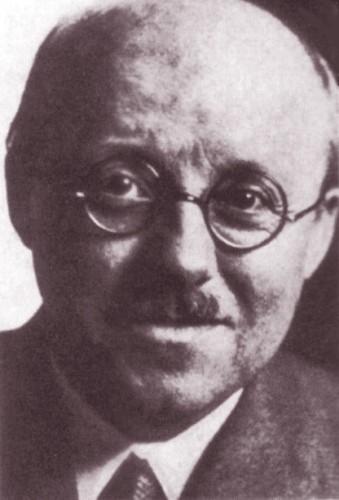

 del.icio.us
del.icio.us
 Digg
Digg![9783937820170[1].JPG](http://euro-synergies.hautetfort.com/media/01/02/3354357282.JPG)
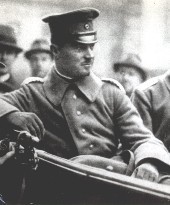
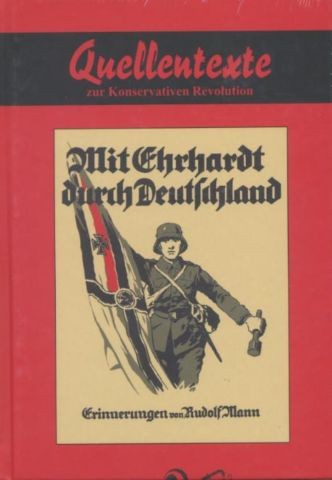 Au début du mois de mars 1920, Ehrhardt entre en rébellion contre l’ordre de dissolution et rejoint le putsch dit de Kapp, mené par un haut fonctionnaire prussien, Wolfgang Kapp, et par un général d’infanterie, Walther von Lüttwitz. La mission de la Brigade Ehrhardt était d’occuper le quartier gouvernemental de la capitale. Au cours de ce putsch, Ehrhardt a fait savoir ce qu’il entendait par “application de la violence” en cas de coup d’Etat: après que les fonctionnaires berlinois aient refusé de travailler pour le gouvernement putschiste, Ehrhardt aurait dit: “Eh bien, nous allons coller au mur les trois premiers fonctionnaires qui refusent de travailler. On verra bien alors si le reste va se mettre à travailler ou non”. Lorsque Kapp refusa d’appliquer cette mesure drastique, Ehrhardt a lâché ce commentaire: “Alors le putsch est fichu!”.
Au début du mois de mars 1920, Ehrhardt entre en rébellion contre l’ordre de dissolution et rejoint le putsch dit de Kapp, mené par un haut fonctionnaire prussien, Wolfgang Kapp, et par un général d’infanterie, Walther von Lüttwitz. La mission de la Brigade Ehrhardt était d’occuper le quartier gouvernemental de la capitale. Au cours de ce putsch, Ehrhardt a fait savoir ce qu’il entendait par “application de la violence” en cas de coup d’Etat: après que les fonctionnaires berlinois aient refusé de travailler pour le gouvernement putschiste, Ehrhardt aurait dit: “Eh bien, nous allons coller au mur les trois premiers fonctionnaires qui refusent de travailler. On verra bien alors si le reste va se mettre à travailler ou non”. Lorsque Kapp refusa d’appliquer cette mesure drastique, Ehrhardt a lâché ce commentaire: “Alors le putsch est fichu!”. Dès ce moment, les nationaux-socialistes considèreront Ehrhardt comme une personnalité peu fiable. Le Capitaine a perdu aussi beaucoup de son prestige dans les rangs des droites allemandes. En avril 1924, vu l’imminence d’un procès pénal, Hermann Ehrhardt quitte le Reich pour l’Autriche; il revient en octobre 1926 après une amnistie générale décrétée par le Président Paul von Hindenburg. En 1931, Ehrhardt fonde le groupe “Gefolgschaft” (littéralement: la “Suite”), qui, malgré la perte de prestige subie par Ehrhardt, parvient encore à rassembler plus de 2000 de ses adhérants, ainsi que des nationaux-socialistes et des communistes déçus. Ils voulaient empêcher Hitler de prendre le pouvoir et fustigeaient la “mauvaise politique de la NSDAP”. Ehrhardt entretenait des rapports avec Otto Strasser et l’aile socialiste de la NSDAP. En 1933, Ehrhardt s’installe sur les terres du Comte von Bredow à Klessen dans le Westhavelland. En juin 1934, quand Hitler élimine Röhm, Ehrhardt aurait normalement dû faire partie des victimes de la purge. Il a réussi à prendre la fuite à temps devant les SS venus pour l’abattre, en se réfugiant dans la forêt toute proche. Les sicaires ne l’ont que mollement poursuivi car, dit-on, beaucoup de membres de sa Brigade avaient rejoint les SS. Ehrhardt s’est d’abord réfugié en Suisse puis, en 1936, en Autriche, où son épouse, le Princesse Viktoria zu Hohenlohe-Öhringen possédait un château à Brunn im Walde dans le Waldviertel. Ehrhardt n’a plus fait autre chose que gérer ces terres, que participer à des chasses au gibier et que s’adonner à la sylviculture. Il s’est complètement retiré de la politique.
Dès ce moment, les nationaux-socialistes considèreront Ehrhardt comme une personnalité peu fiable. Le Capitaine a perdu aussi beaucoup de son prestige dans les rangs des droites allemandes. En avril 1924, vu l’imminence d’un procès pénal, Hermann Ehrhardt quitte le Reich pour l’Autriche; il revient en octobre 1926 après une amnistie générale décrétée par le Président Paul von Hindenburg. En 1931, Ehrhardt fonde le groupe “Gefolgschaft” (littéralement: la “Suite”), qui, malgré la perte de prestige subie par Ehrhardt, parvient encore à rassembler plus de 2000 de ses adhérants, ainsi que des nationaux-socialistes et des communistes déçus. Ils voulaient empêcher Hitler de prendre le pouvoir et fustigeaient la “mauvaise politique de la NSDAP”. Ehrhardt entretenait des rapports avec Otto Strasser et l’aile socialiste de la NSDAP. En 1933, Ehrhardt s’installe sur les terres du Comte von Bredow à Klessen dans le Westhavelland. En juin 1934, quand Hitler élimine Röhm, Ehrhardt aurait normalement dû faire partie des victimes de la purge. Il a réussi à prendre la fuite à temps devant les SS venus pour l’abattre, en se réfugiant dans la forêt toute proche. Les sicaires ne l’ont que mollement poursuivi car, dit-on, beaucoup de membres de sa Brigade avaient rejoint les SS. Ehrhardt s’est d’abord réfugié en Suisse puis, en 1936, en Autriche, où son épouse, le Princesse Viktoria zu Hohenlohe-Öhringen possédait un château à Brunn im Walde dans le Waldviertel. Ehrhardt n’a plus fait autre chose que gérer ces terres, que participer à des chasses au gibier et que s’adonner à la sylviculture. Il s’est complètement retiré de la politique.
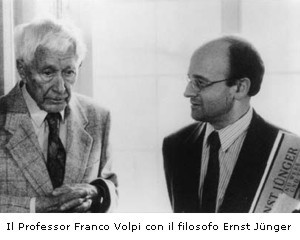
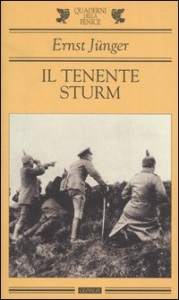




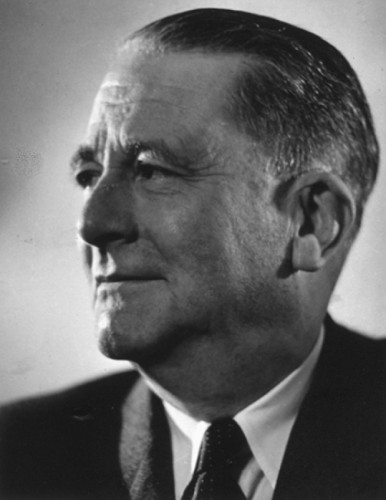
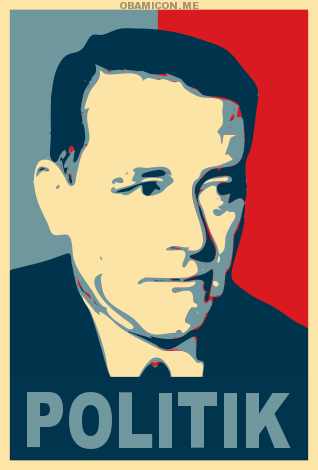 Since 1945 Western nations have witnessed a dramatic reduction in the variety of positions in political theory and jurisprudence. Political argument has been virtually reduced to contests within liberal-democratic theory. Even radicals now take representative democracy as their unquestioned point of departure. There are, of course, some benefits following from this restriction of political debate. Fascist, Nazi and Stalinist political ideologies are now beyond the pale. But the hegemony of liberal-democratic political agreement tends to obscure the fact that we are thinking in terms which were already obsolete at the end of the nineteenth century.
Since 1945 Western nations have witnessed a dramatic reduction in the variety of positions in political theory and jurisprudence. Political argument has been virtually reduced to contests within liberal-democratic theory. Even radicals now take representative democracy as their unquestioned point of departure. There are, of course, some benefits following from this restriction of political debate. Fascist, Nazi and Stalinist political ideologies are now beyond the pale. But the hegemony of liberal-democratic political agreement tends to obscure the fact that we are thinking in terms which were already obsolete at the end of the nineteenth century.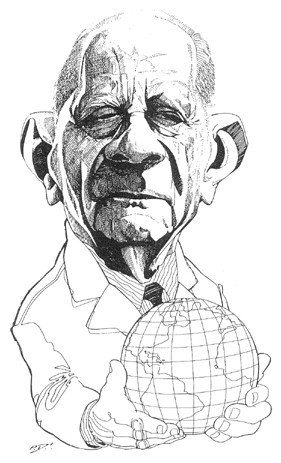

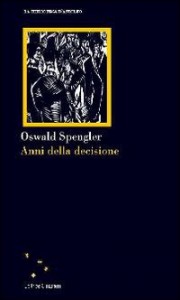
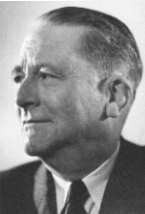 In a certain sense, there have been total wars at all times; a theory of the total war, however, presumably dates only from the time of Clausewitz who would talk of “abstract” and “absolute” wars.”[1] Later on, under the impact of the experiences of the last Great War, the formula of total war has acquired a specific meaning and a particular effectiveness. Since 1920, it has become the prevailing catchword. It was first brought out in sharp relief in the French literature, in book titles like La guerre totale. Afterwards, between 1926 and 1928, it found its way into the language of the proceedings of the disarmament committee at Geneva. In concepts such as “war potential” (potentiel de guerre), “moral disarmament” (désarmement moral) and “total disarmament” (désarmement total). The fascist doctrine of the “total state” came to it by way of the state; the association yielded the conceptual pair: total state, total war. In Germany, the publication of the Concept of the Political has since 1927 expanded the pair of totalities to a set of three: total enemy, total war, total state. Ernst Jünger’s book of 1930 Total Mobilization made the formula part of the general consciousness. Nonetheless, it was only Ludendorff’s 1936 booklet entitled Der Totale Krieg (The Total War) that lent it an irresistible force and caused its dissemination beyond all bounds.
In a certain sense, there have been total wars at all times; a theory of the total war, however, presumably dates only from the time of Clausewitz who would talk of “abstract” and “absolute” wars.”[1] Later on, under the impact of the experiences of the last Great War, the formula of total war has acquired a specific meaning and a particular effectiveness. Since 1920, it has become the prevailing catchword. It was first brought out in sharp relief in the French literature, in book titles like La guerre totale. Afterwards, between 1926 and 1928, it found its way into the language of the proceedings of the disarmament committee at Geneva. In concepts such as “war potential” (potentiel de guerre), “moral disarmament” (désarmement moral) and “total disarmament” (désarmement total). The fascist doctrine of the “total state” came to it by way of the state; the association yielded the conceptual pair: total state, total war. In Germany, the publication of the Concept of the Political has since 1927 expanded the pair of totalities to a set of three: total enemy, total war, total state. Ernst Jünger’s book of 1930 Total Mobilization made the formula part of the general consciousness. Nonetheless, it was only Ludendorff’s 1936 booklet entitled Der Totale Krieg (The Total War) that lent it an irresistible force and caused its dissemination beyond all bounds.
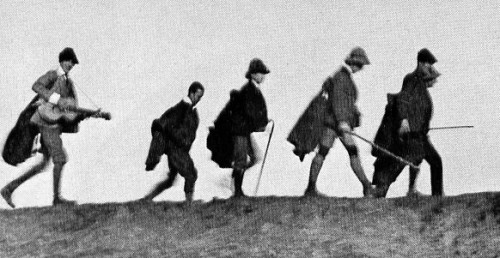
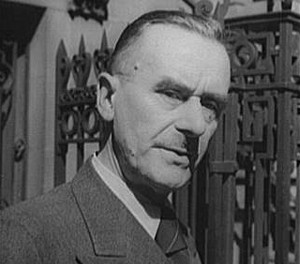
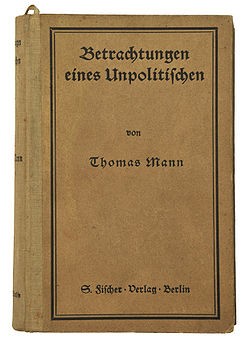
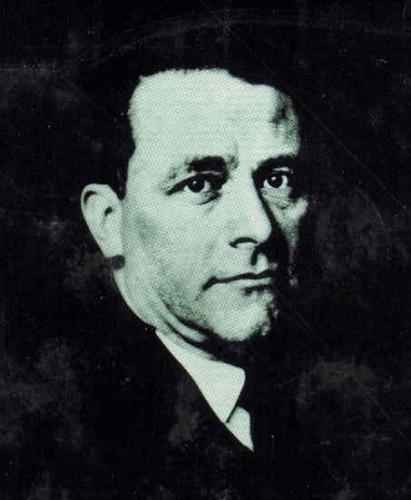
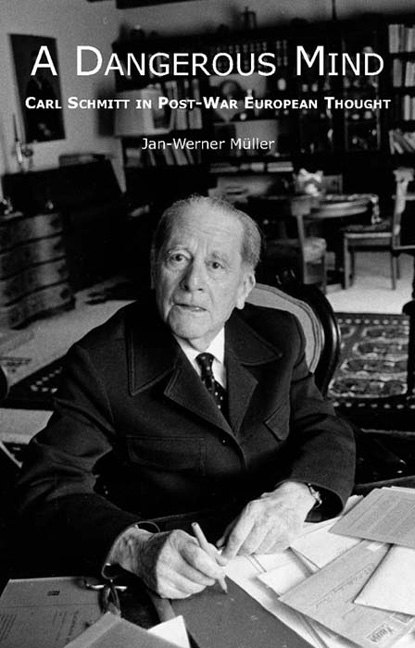
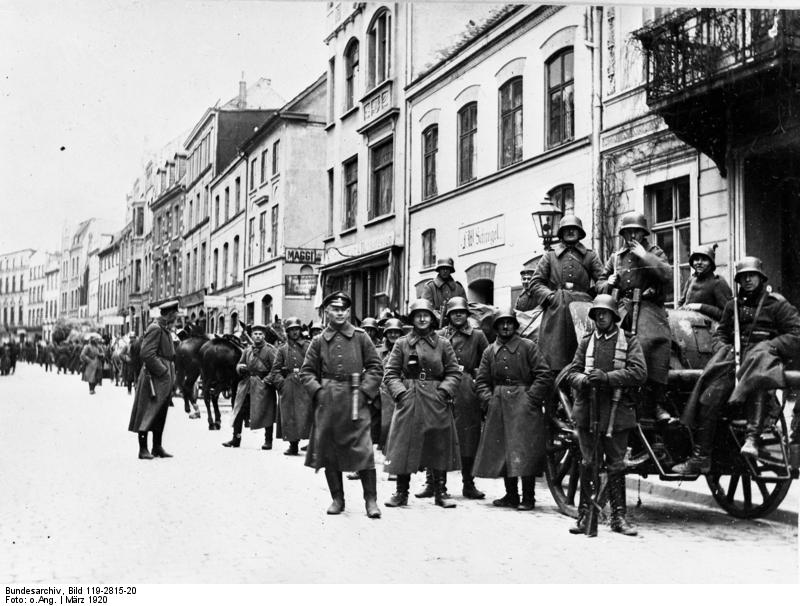


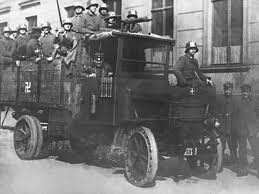


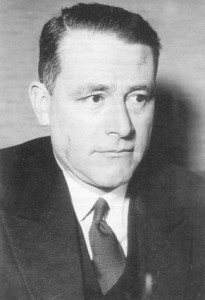 Carl Schmitt’s short book
Carl Schmitt’s short book